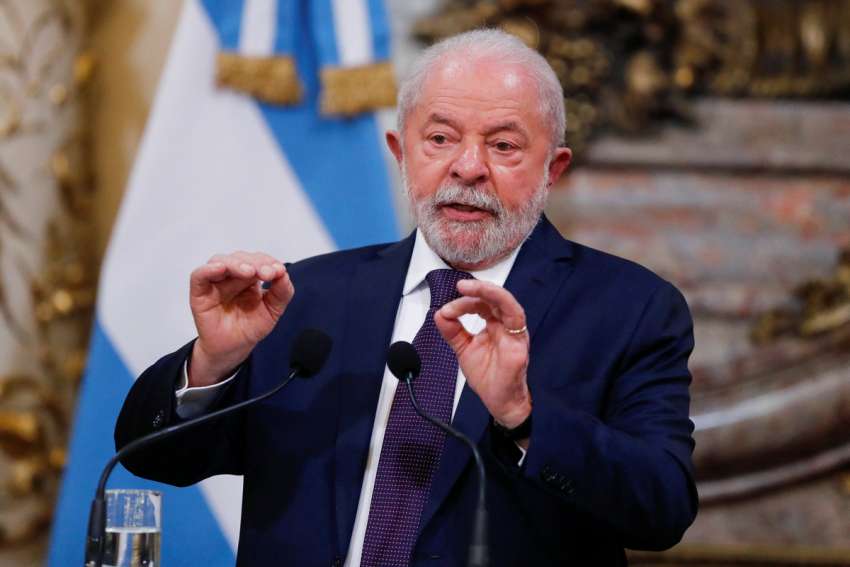“In a word, yes. We can call it genocide,” Consolata Missionary Fr. Bob Franks told The Catholic Register in a WhatsApp call from the Brazilian state of Roraima.
Franks lives and works with the Yanomami people in Catrimani — a missionary post surrounded by forest about halfway between the Roraima capital of Boa Vista and the major city of Manaus on the Amazon River.
“These people, they are human beings. They need their dignity. They need to be protected,” Franks, a 33-year-old missionary from Uganda, said.
First reported by the Brazilian journalism platform Sumaúma, news of famine in some Yanomami villages, combined with a wave of malaria, various viruses new to the immune systems of isolated people, abandonment of health facilities, mercury poisoning in rivers and fish prompted the country’s new president to travel north to assess the situation.
“I came here to say we are going to treat our Indigenous people as human beings,” Lula told reporters. He later tweeted that what he saw on his visit was “a genocide.”
The United Nations describes genocide as a crime with the “intent to destroy a national, ethnic, racial or religious group, in whole or in part.”
Sumaúma’s investigation into conditions in Yanomani territory revealed official data showing 570 Indigenous children have died from preventable causes during the last four years under the previous government of Jair Bolsonaro, a 29 per cent increase over the previous four years.
In response, Lula set up a multi-ministerial federal government response team and promised to rebuild the government’s services to Indigenous people, which were neglected or undermined by the Bolsonaro government. Lula’s team immediately airlifted 16 frail and malnourished Yanomami south for medical treatment. The government declared a public health emergency and its justice minister has requested an investigation “into crimes of genocide” as well as the failure to provide emergency assistance to the Yonamami people.
Canadian missionary Fr. Ron MacDonell of the Scarboro Missions has worked in Roraima more than 20 years, primarily with the Makushi people. He said he was shocked by the famine in Yanomami Indigenous Territory.
“The situation of suffering of the Yanomami leaves me, in part, angry,” he said in a text message to The Catholic Register. “But mostly sad. Sad, because our unjust economic systems allow for the total disregard of a people and their autonomy. Their dignity and very lives are destroyed for the economic gain of a few. When will we learn that it is love, not money, that matters? Love is expressed through respect for the life and dignity of all peoples.”
The bioethics commission of Brazil’s national conference of Catholic bishops responded to the revelations out of Yanomami Indigenous Territory with an expression of “indignation and a deep feeling of sadness.”
“Misery, exploitation, poverty, hunger and oblivion affect human life as much as the scourges of abortion and euthanasia,” the CNBB (Conferência Nacional dos Bispos do Brasil) commission wrote.
Franks, who has lived with the Yanomami since 2019 and speaks their language, doesn’t want to let the Bolsonaro government off the hook, but cautions the problems the Yanomami face are complex and deeply rooted.
“These images you are getting from Yanomami land, it’s not a problem that started yesterday,” he said. “It is the result of a lot of things, a lot of actions that were not taken ever since the ‘80s.”
The most immediate cause is the presence of gold on Yanomami land, which has attracted at least 20,000 illegal miners, or garimpeiros. Franks wonders how giant backhoes and drills get past the police who are supposed to be guarding access points into the Yanomami Indigenous Territories.
“Corruption is everywhere, you understand,” he said. “The moment you mine, the moment you destroy all the trees, the rivers, the forest, you render them (Yanomami) homeless.”
Mining on Yanomami Indigenous Territory exploded during the Bolsonaro years, under a president who has publicly wished Indigenous Brazilians had been “exterminated” at some earlier time. Bolsonaro has called setting aside territory for the Yanomami “criminal” and his government tried to change Brazil’s constitution to open up Indigenous lands to mining, logging, cattle and soy production.
CIMI, the missionary organization of Brazil’s bishops, pointed the finger at Bolsonaro’s government.
“What happened in the Yanomami Indigenous Territory during the last four years was a premeditated crime — a systematic kill-or-let-die operation,” CIMI said in a release.
Mining has invaded Yanomami Indigenous Territory “with the ferocity of organized crime,” former Roraima archbishop and vice president of the CNBB Dom Mário Antônio said in statement.
“It is a fantasy to think that the Church does not need to be in the fight for the most impoverished,” the bishop said in an interview for the CNBB web site. “The Church of Roraima, like the entire Catholic Church, when it places itself on the side of the defenceless, the poorest, has been the great witness of Jesus Christ.”


